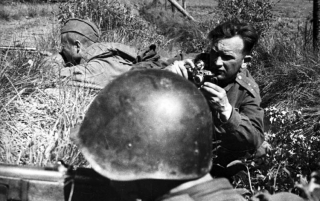From 5 November 2010 onwards, the German-Russian Museum in Berlin-Karlshorst1 is presenting the photo exhibition “Chandogin – War Photography from Karelia and Leningrad 1939-1944”. Since years, this museum is curating excellent exhibitions of Soviet photographers who often are hardly known in the West. This exhibition shall not the least be interesting, as its first focus is on the Soviet-Finnish Winter War of 1939-1940, about which relatively few photos are available.


The Leningrad2 photojournalist Nikolai I. Chandogin (1909-1989) is one of the few photographers who took pictures of the Soviet-Finnish Winter War of 1939/40 in Karelia. The result was images of a virtually unknown theater of war. Chandogin, who had been working since 1935 for “On Guard for the Homeland”, the newspaper of the Leningrad Military District, was assigned to photograph the Leningrad Front after the German assault on the Soviet Union on June 22, 1941. In the exhibition, his photographs of the front and of wartime Leningrad, Estonia and Karelia are supplemented by pictures he took during the German siege of Leningrad. Chandogin’s interest was in depicting the death and survival of the inhabitants of the second largest Soviet city, who were cut off from vital lines of communication between September 1941 and January 1944. After the war, Chandogin continued to work for “On Guard for the Homeland”, as well as for two popular magazines, “Soviet Union” and “Ogoniok”.
The exhibition is accompanied by a substantial catalogue with 152 pages (hardcover 24,95 €; as softcover in the museum 15,00 €). The exhibition is part of the 4th European Month of Photography (15 October – 28 November 2010).
“Chandogin – War Photography from Karelia and Leningrad 1939-1944”
5 November 2010 – 6 February 2011
Deutsch-Russisches Museum Berlin-Karlshorst
Zwieseler Str. 4/corner of Rheinstr.
10318 Berlin-Karlshorst
Germany
Opening: 4 November 2010, 1800h
- On 8/9 May 1945 at the then Army Combat Engineers Barracks, the unconditional surrender of the German Wehrmacht was signed again and thus ratified, therefore ending the Second World War in Europe. ↩
- Between 1924 and 1991, the now Russian city of St. Petersburg was renamed as Leningrad after Vladimir Ilyich Lenin. ↩





